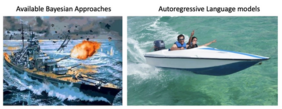Our paper "Higher-Order DeepTrails: Unified Approach to *Trails" has been accepted to LWDA KDML 2023
31.08.2023Our paper "Higher-Order DeepTrails: Unified Approach to *Trails" presents an alternative approach using autoregressive language models to the Bayesian methods HypTrails, MixedTrails and SubTrails.
Abstract: Analyzing, understanding, and describing human behavior is advantageous in different settings, such as web browsing or traffic navigation. Understanding human behavior naturally helps to improve and optimize the underlying infrastructure or user interfaces. Typically, human navigation is represented by sequences of transitions between states. Previous work suggests to use hypotheses, representing different intuitions about the navigation to analyse these transitions. To mathematically grasp this setting, first-order Markov chains are used to capture the behavior, consequently allowing to apply different kinds of graph comparisons, but comes with the inherent drawback of losing information about higher-order dependencies within the sequences. To this end, we propose to analyse entire sequences using autoregressive language models, as they are traditionally used to model higher-order dependencies in sequences. We show that our approach can be easily adapted to model different settings introduced in previous work, namely HypTrails, MixedTrails and even SubTrails, while at the same time bringing unique advantages: 1. Modeling higher-order dependencies between state transitions, while 2. being able to identify short comings in proposed hypotheses, and 3. naturally introducing a unified approach to model all settings. To show the expressiveness of our approach, we evaluate on different synthetic datasets and conclude with an exemplary analysis of a real-world dataset, examining the behavior of users interacting with voice assistants.


